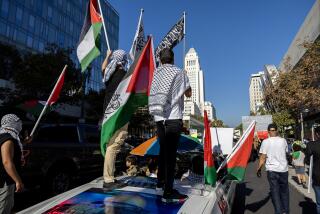Ahmadinejad sworn in as riot police quell protest
Dogged by allegations of election fraud and battered by some within his own conservative camp, Mahmoud Ahmadinejad limped defiantly into his second term as Iran’s president Wednesday, vowing to strive for “national greatness.”
As he was sworn in, the empty seats of reformist and moderate politicians boycotting the ceremony gaped from the gallery inside the parliament building while police fired tear gas and swung truncheons to quell a demonstration outside. Both highlighted the domestic challenges Ahmadinejad faces in attempting to consolidate his power and implement his hard-line agenda.
Ahmadinejad told lawmakers and dignitaries he would dedicate himself to serving the Iranian people and to taking bold steps on the world stage.
“It is not important who voted for whom. What we need is national greatness,” he said in a speech broadcast live on television after he was sworn in by the judiciary chief, Ayatollah Mahmoud Hashemi Shahroudi. “We are representing a great nation. It needs great decisions and great deeds. We need to take great steps.”
But Ahmadinejad might find achieving greatness a long, hard road, analysts said. He has built his political base on populist economic giveaways and a defiant foreign policy that have won him the fealty of Iran’s supreme leader, Ayatollah Ali Khamenei, but may be difficult to maintain. His unyielding drive may have endeared him to some, but has also led to significant clashes within his own hard-line camp, some members of which skipped the ceremony.
“He is facing problems and disputes even among his own . . . faction, let alone a widening gap with the people outside the government,” said Ahmad Shirzad, a political analyst and physicist. “Ahmadinejad started his second term in abnormal condition, and his popularity is low and weak.”
The Obama administration has said it would recognize Ahmadinejad as Iran’s leader, though Secretary of State Hillary Rodham Clinton praised the opposition Wednesday during an appearance in Africa.
The governments of the United States, Britain, France and Germany have said they would not send him a customary note of congratulations, and Ahmadinejad responded with characteristic defiance.
“No one in Iran is waiting for your congratulations,” he said. “We do not value your congratulations and we don’t value your smiles.”
Despite such bluster, Ahmadinejad faces an emboldened, savvy opposition camp unlike anything Iran has experienced in recent years. The unpredictable and loosely organized protest movement continues to defy authorities and the traditional blunt instruments of state.
Amateur video taken during the inauguration ceremony showed thousands of people gathering around the parliament before they were forcefully dispersed by as many as 6,000 security personnel.
Presidential candidate Mir-Hossein Mousavi and other reformist politicians, emerging as leaders of the movement, continue to publicly question the election results and the government’s legitimacy.
“Neither Mousavi nor I have stood back,” Mehdi Karroubi, a former parliamentary speaker and also a presidential candidate who boycotted the inauguration, said in comments quoted by several Persian-language news websites. “We will continue our protests. We will never work with this government. We won’t damage the government, but we will criticize its actions.”
Ahmadinejad also faces challenges from his conservative rivals, including parliamentary speaker Ali Larijani, who presided over Wednesday’s ceremony, as well as Tehran Mayor Mohammed Bagher Qalibaf and former Revolutionary Guard chief Mohsen Rezai, who both skipped it.
Even amid weeks of unrest, fellow conservatives in parliament and elsewhere criticized Ahmadinejad’s policies and actions, especially his appointment of a controversial aide, Esfandiar Rahim Mashaei. The president’s next challenge will be forming a Cabinet, which he must do within two weeks.
“He has to give in to the lawmakers and get their consensus,” said Sadegh Zibakalam, a Tehran University political scientist. “If he doesn’t want to take that course and be stubborn the way he has always been, I believe he will have a great deal of problems with parliament.”
Ahmadinejad began his first term as oil prices rose and produced a record windfall, much of which he lavished on popular rural reconstruction projects and low-interest loans. But depressed oil and commodity prices heighten his challenges. Experts predict increased unemployment and decreased investment because of continued insecurity and instability.
The government is bracing for more unrest over plans to cut subsidies and implement a 7% sales tax. A Western initiative to sanction foreign companies that sell refined petroleum products to Iran also could strangle the economy.
A unified nation would be better able to weather such a storm, but the Islamic Republic finds itself deeply divided.
“If the government wants to reduce subsidies and make change to the economy, all walks of society should help and widespread popular participation is needed,” said Jamshid Edalatiyan, a Tehran-based analyst with a Swiss market data firm. “Otherwise, the government will fail in its economic policies.”
--
Mostaghim is a special correspondent.
More to Read
Start your day right
Sign up for Essential California for news, features and recommendations from the L.A. Times and beyond in your inbox six days a week.
You may occasionally receive promotional content from the Los Angeles Times.






